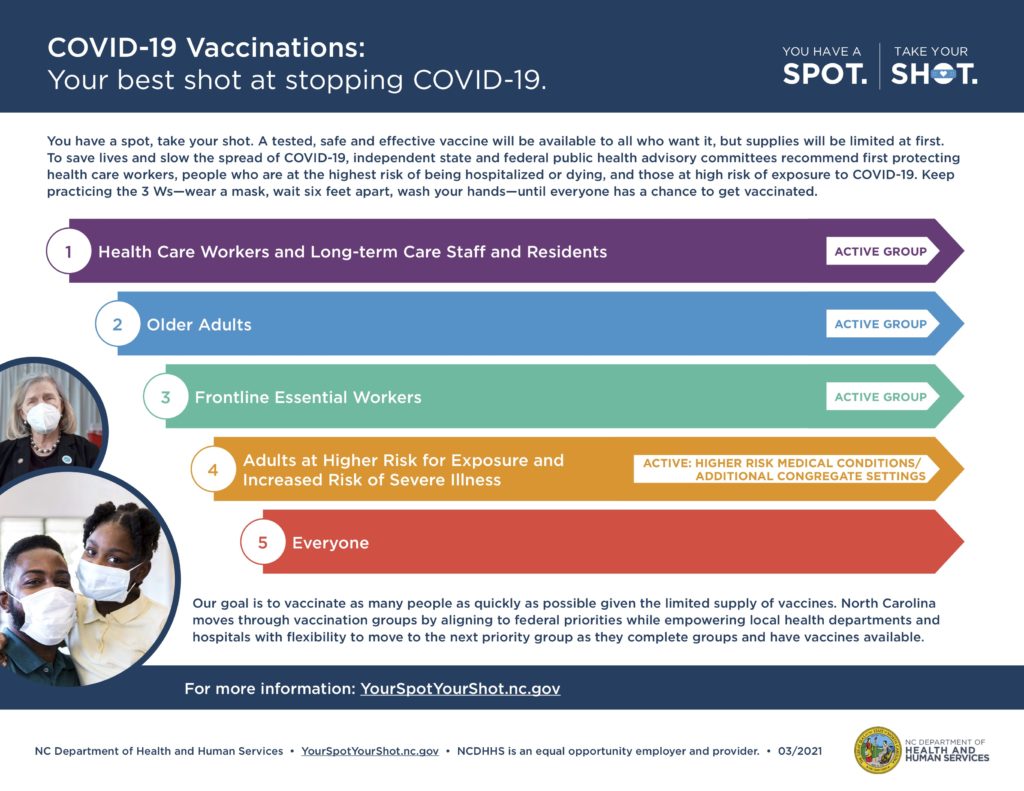After a long, difficult pandemic, seeing more and more vaccines being administered can feel like the light at the end of the tunnel. When the vaccine is available for you, the doctors at Gaston Medical Partners recommend getting it as quickly as you can, not just to keep yourself safe but to keep your friends, family and the community healthy.
When planning ahead for your COVID-19 vaccine appointment, follow these six tips to make sure the process goes smoothly and you feel informed, safe and comfortable along the way.
Before Your Appointment
1. Take the First Appointment Available to You
With vaccine appointments available at multiple distributors, it’s important to get the vaccine whenever and wherever you can. The first step is understanding which distribution group you fall into. The North Carolina Department of Health and Human Services (NCDHHS), which is managing vaccine distribution, has created five vaccination groups to get people vaccinated as quickly as possible, starting with those at the highest risk for getting dangerously sick. To learn which group you fall into, take their online survey. Once the vaccine is available for your group, use the NCDHHS’ vaccine finder to locate an appointment that is convenient for you.
While many people express wanting to get the vaccine with their primary care physician or hoping for a specific version of the vaccine, it is most important to make the first available appointment to assure your health and the health of your loved ones. All approved versions of the vaccine are highly effective at fighting coronavirus.
2. Plan to Manage the Side Effects
Be aware that the COVID-19 vaccine does have some side effects, which are expected. Much like the flu vaccine, the COVID-19 vaccine will make your arm a bit sore. You may also experience a day or two of fever, achiness and joint stiffness. These side effects mean your immune system is working to create the antibodies that will help fight off COVID-19 if you are exposed.
You may want to plan ahead for these side effects, knowing you may not feel your best right after being vaccinated. Acetaminophen or NSAIDs can be helpful in managing these symptoms after you have been vaccinated. It is not yet known if these medicines could impact your antibody production so avoid taking them prior to your appointment, unless they are part of your prescribed regimen, like for fighting chronic pain.
3. Dress Comfortably and Wear a Mask
The COVID-19 vaccine, just like your flu shot, is given in the upper arm. Wear clothes that allow easy access to your arm, like a T-shirt. At your appointment, be sure to follow all the precautions we have to fight COVID-19. Wear a mask, stay socially distanced from others and wash your hands.
After Your Appointment
4. Put Your Next Dose on the Calendar
If the vaccine you’ve received takes two doses, like those from Moderna or Pfizer, your vaccine distributor should make your second appointment before you leave. Be sure to put that appointment on your calendar and prioritize going, as it takes both doses to get the best protection. At 94-95% effective, these vaccines work very well at fighting COVID-19, but it takes about two weeks after both doses have been administered to reach this full effectiveness.
5. Continue Taking Precautions Seriously
Over the course of the pandemic, we have come to know well the precautions that fight COVID-19, from wearing masks to remaining distant from others. It’s important to continue putting these precautions into practice as many more people still need to be vaccinated.
Your trusty vaccine card does not mean it’s time to put precautions aside. Asymptomatic spread is still possible, meaning people may feel fully healthy but are still able to spread the COVID-19 virus to others, which is especially dangerous for the population who has not yet been vaccinated.
6. Don’t Ignore Your Other Health Needs
During the pandemic, many people have put aside their ongoing health needs for fear of going to their doctor’s office. It’s important not to ignore your ongoing care.
At Gaston Medical Partners, we continue to take precautions to assure our offices are optimized for your safety. Staying healthy means seeing your physician even when you are well, for annual visits. These appointments keep you at your best health.

